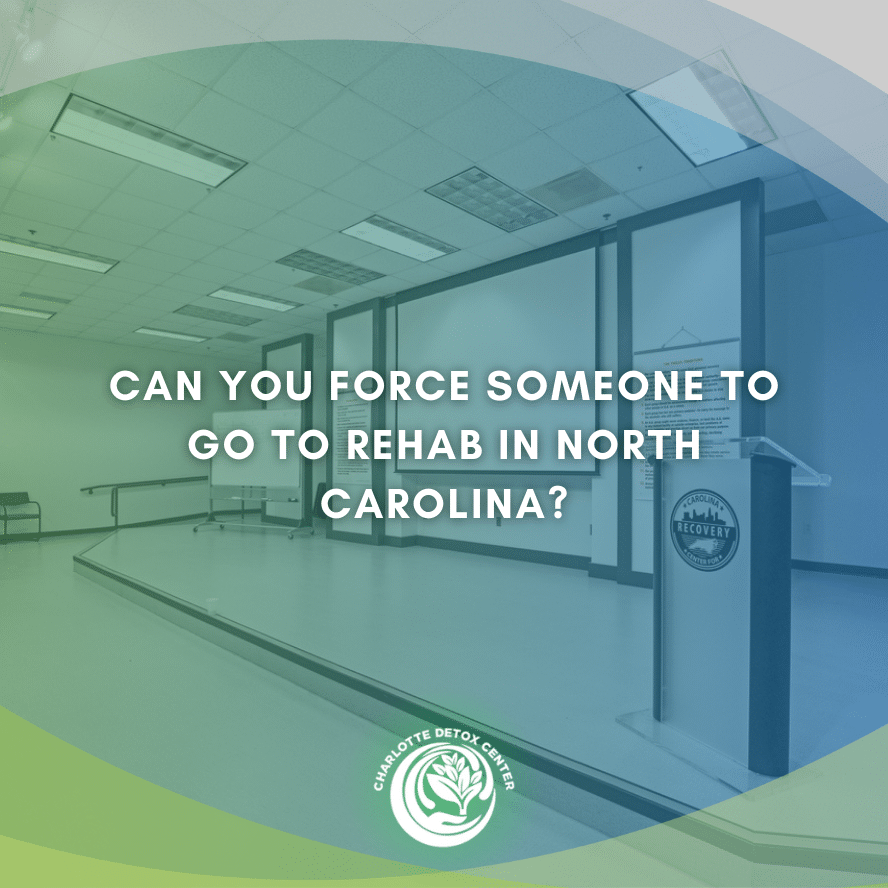Can You Force Someone to Go to Rehab in North Carolina?

Medically Verified: 2/1/24
Medical Reviewer
Chief Editor

All of the information on this page has been reviewed and verified by a certified addiction professional.
Nothing can be as heartbreaking as witnessing someone you care about struggle with alcohol or drug dependency. As friends or family of an addict, you may try to do everything in your power to support your addicted loved one – including considering taking legal action to force someone to go to rehab in North Carolina as a last resort.
Why Force Someone Into Rehab?
Addiction can be complex and often comes with denial; those in active addiction may not realize its severity until confronted, which can lead them to become defensive and angry if confronted about attending an addiction treatment program.
These are among the reasons why individuals may try to pressure their loved ones into rehab.
Situations may also become so dire for a person in North Carolina that they risk harming themselves – for instance, a mental illness crisis, suicidality, or repeated overdoses could all put them in jeopardy of harming themselves.
Families may force someone into rehab in North Carolina if they believe that person poses a threat to themselves or to others. Rehab can change a person’s life for the better, and it can save the lives of people struggling with addiction.
Forced Rehab in North Carolina: Does It Really Work?
Many individuals believe forcing someone into rehab in North Carolina could make them angry and resistant, and wonder whether such treatment is worth their efforts. They wonder whether forced rehabilitation works and are wondering whether forced rehab should even exist at all.
Research is scarce on the effectiveness of involuntary rehabilitation, as few individuals voluntarily attend rehabilitation sessions.
Most people only go into rehab when they feel forced to do so, such as addicts who feel safer in a rehab facility than on the streets. Even one night spent in treatment can give addicts the hope they need. While your loved one may be reluctant to accept help at first, they may warm up to the idea of rehab and sobriety as they are immersed in a sober, supportive environment.
Can You Legally Force Someone into Rehab in North Carolina?
North Carolina, like many other states, has laws in place that allow family members to legally force their loved ones into treatment programs through involuntary commitment.[1]
North Carolina’s law on involuntary commitment hasn’t changed in decades, according to advocates who point out that certain details of the law are unclear. While North Carolina healthcare advocates feel like updating this provision would give patients better care, anyone in North Carolina who meets certain criteria can be forced into rehabilitation programs against their will by friends or family members.
Understanding North Carolina’s Involuntary Commitment Process
State laws for voluntary commitment vary from one state to the next, but most require family, friends, or anyone who knows someone personally to provide proof of harm/danger and induce someone to attend rehab. In North Carolina’s case, family, friends, or others with firsthand knowledge must present evidence to the court in order to prove that the individual is in need of addiction treatment.
Anyone in North Carolina with knowledge of another’s substance abuse disorder or altered mental state can petition the court for involuntary treatment programs to be ordered for them.
A magistrate or judge will issue a custody order upon finding sufficient information in the petition to commit the person. They will then be taken to an evaluation facility where their condition will be evaluated further.
After conducting a comprehensive assessment, medical personnel will recommend an effective plan of treatment to address patient symptoms. Treatment options could include:[1][2][3]
- Medical detox
- Inpatient rehab
- Outpatient rehab
A community crisis center must transport patients who have been admitted for treatment at hospitals or treatment facilities. De-escalation techniques must be utilized and physical restraints should be avoided unless absolutely necessary.
If after 24 hours the clinical team still believes that treatment is necessary, they may require the patient to continue the plan of care.
Within 10 days following involuntary commitment, a hearing will be scheduled to reevaluate both patient status and court orders. After their expiration date has passed, patients may be discharged unless further treatment is necessary.
Find Help for an Addicted Loved One
Beating addiction is difficult, but with the support of friends and family and the right treatment, anyone can recover. While voluntarily checking into rehab is always preferred, forcing someone to go becomes an option when their safety is at risk. Taking steps to force your loved one into a treatment program may be one of the best decisions you ever make for yourself and your loved one.
At Charlotte Detox Center, our admissions team is available 24 hours a day to answer any questions you may have, verify your insurance, and talk to your addicted loved one to try and convince them to get the help they need. Our admissions counselors can also aid in organizing an intervention or finding rehabilitation facilities nearby.
Now is the time to begin; call for immediate support today.
